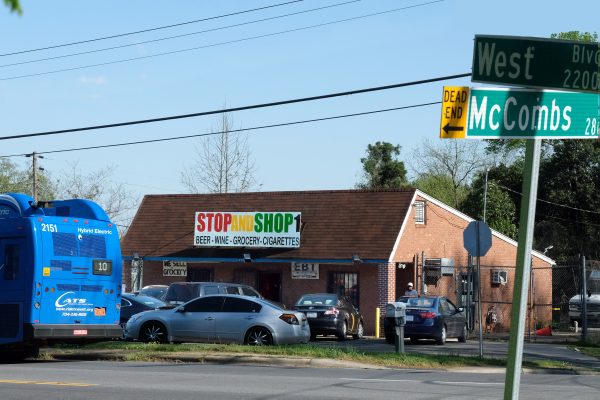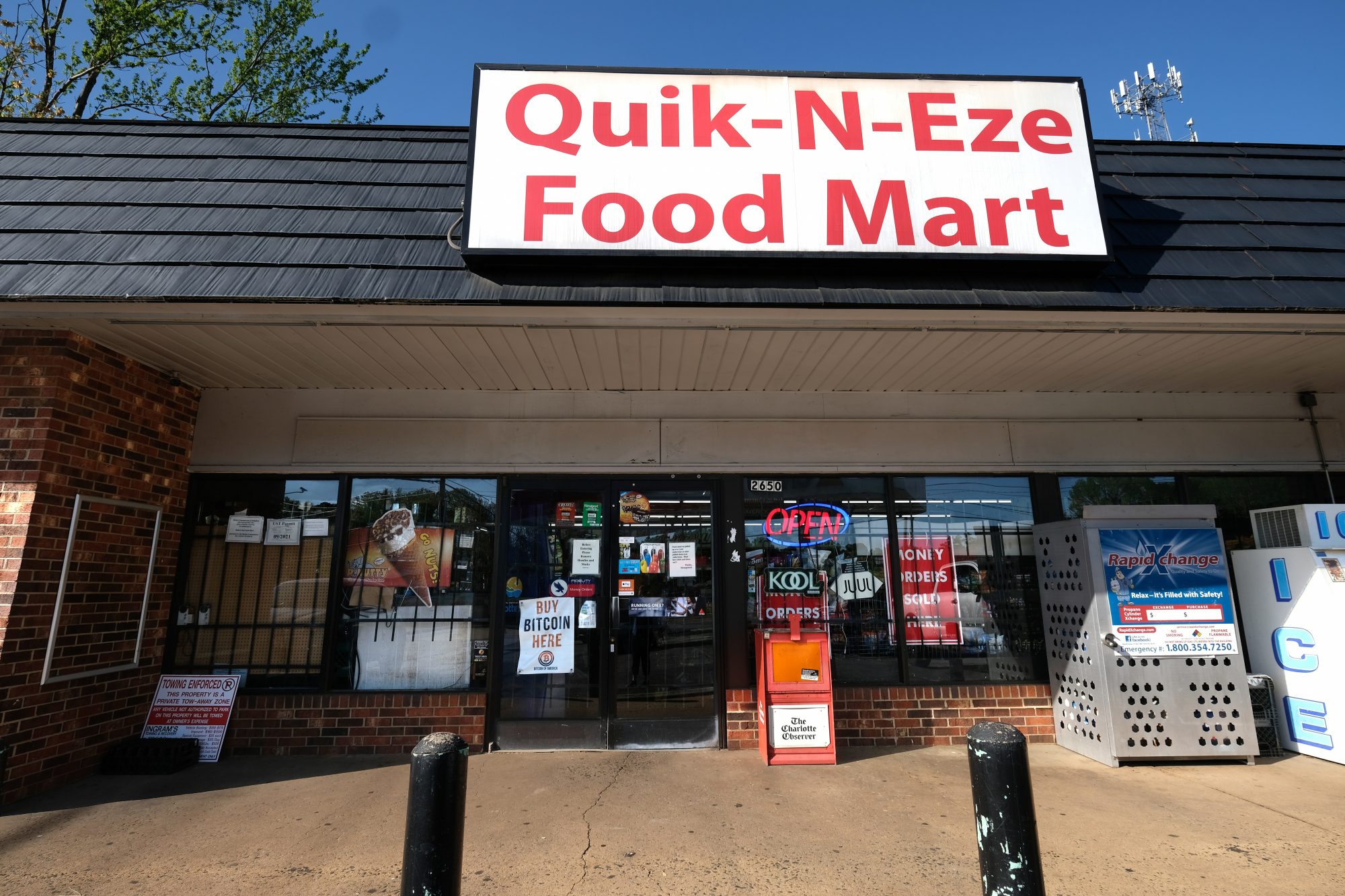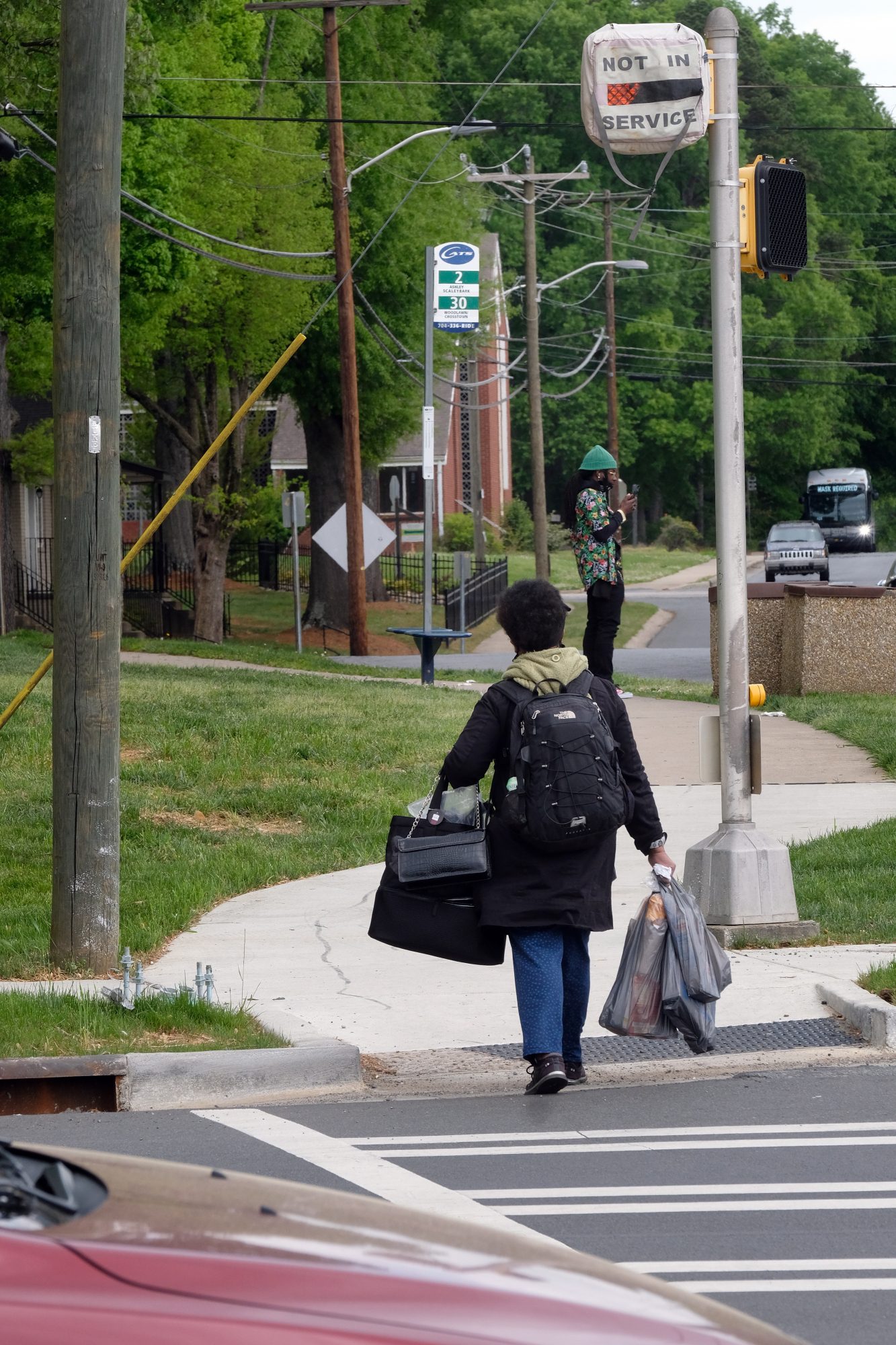Designing a new solution for food insecurity in West Charlotte

Designing a new solution for food insecurity in West Charlotte
By Mae Israel
A large black-and-white sign on the front of the Stop N Shop convenience store on West Boulevard, the commercial center of several historic West Charlotte neighborhoods, invites customers inside with a promise: “We Sell Groceries.”
Behind several rows of candy, chips and other snack foods, two floor freezers hold the main grocery options: Bags of frozen fries, onion rings and chicken wings, along with personal pizzas and Hot Pockets.
There are at least eight other convenience stores, some attached to gas stations, and two Family Dollar discount stores along the 3 ½ -mile stretch of West Boulevard from Interstate 77 near uptown Charlotte to Billy Graham Parkway. None sells fresh produce or fresh meats. There is no grocery store.
A lack of easy access to healthy food and full-size grocery stores is hardly a new issue for most predominantly Black neighborhoods in West Charlotte. However, a partnership between University of North Carolina Charlotte and Johnson C. Smith University researchers and community leaders, supported by Mecklenburg County, is bringing a different approach to tackling the racial inequity in our food system.
“When you look at the opportunity, it can’t be just another bridge to nowhere,” said Rickey Hall, president of the West Boulevard Neighborhood Coalition, which is working to improve food options and address other concerns in the area. “If we’re talking about social and economic mobility, if we’re talking about overcoming systemic racism, if we’re talking about Charlotte growing, this has to work — or else we will set these communities up for gentrification and displacement.”
With access to the university’s extensive research resources, UNC Charlotte’s Office of Urban Research and Community Engagement is facilitating an action research initiative that actively engages community leaders and residents as partners in figuring out options for more food retail. The seven-month initiative, called the Community Innovation Incubator, also will draw on the expertise and participation of business leaders, financial institutions, nonprofit leaders and others. Faculty from JCSU are also engaged.
In the project’s first phase, researchers and community members agreed on six areas of investigation, covering everything from the possible scope and location of a food retail enterprise to how such an enterprise might operate and how the team will educate the community and earn their buy-in. The team also heard from Omar Jorge, CEO of Compare Foods, to gain insight on the business model behind successful food retailing in underserved communities. photo by Nancy Pierce
And in one of the most important, but technical, parts of the project, the team settled on “ground rules” to govern their work, based on honesty, transparency, candor and true power-sharing between community members and the researchers. These were translated into an MOU that guides project partnerships.
Throughout April and May, the team divided into work groups, studying different aspects of the problem. In May, the team explored possible innovations in two design sessions. A set of recommendations will be presented to Mecklenburg County officials in June.
The goal, said Byron White, Associate Provost of the Office of Urban Research and Community Engagement, is to come up with “something exciting, something bold, something really innovative that captures the community’s imagination and also has the opportunity to be a viable business.”
According to the Charlotte-Mecklenburg Quality of Life dashboard, less than 20 percent of the housing units in most West Charlotte neighborhoods were within ½ mile of a full-service chain grocery store in 2018. By contrast, from 50 percent to 99 percent of housing units in higher income, predominantly white South Charlotte neighborhoods were within ½ mile of a grocery store during the same time period.
“We see that retailers have a great deal of control as to when and if they want to go into an area,” said J’Tanya Adams, founder and program director of Historic West End Partners, which promotes development along Beatties Ford Road. “I think government has to ask itself, are we willing to let our corridors go without fresh food hubs? Are we going to continue to allow corridors to go without grocery stores for decades while the private sector determines food access based on profit margins?”
Over the last year, Mecklenburg County commissioners designated food insecurity and “food deserts” as a top priority and, among other initiatives, approved a $272,000 grant for the Community Innovation Incubator. Its participants include the university’s Charlotte Action Research Project, which has long been engaged with communities in disinvested neighborhoods throughout Charlotte, and the Lee Institute, a non-profit that promotes civic engagement and leadership.
UNC Charlotte and Johnson C. Smith researchers with expertise in architecture and design, marketing, geography, economics and public health are involved. West Charlotte residents who have committed to the new initiative already have been actively involved in improving food access for themselves and their neighbors.
“The first criterion that makes this viable is that the community is already working on it,” said White, who has lived in central city neighborhoods with food access challenges in several areas across the Midwest before moving to Charlotte in August. “This is rallying around community energy, combined with assets from research and civic investment.”
Neighborhoo d organizations participating in the core team include the West Boulevard Neighborhood Coalition, Renaissance West Community Initiative, Historic West End Partners and Reeder Memorial Presbyterian Church. As work continues in coming months, the participants will reach out to not only more residents but to others who can contribute in some way to developing a solution.
d organizations participating in the core team include the West Boulevard Neighborhood Coalition, Renaissance West Community Initiative, Historic West End Partners and Reeder Memorial Presbyterian Church. As work continues in coming months, the participants will reach out to not only more residents but to others who can contribute in some way to developing a solution.
Several key areas are now under review: An analysis to determine the market for food retail, an evaluation of viable food enterprises, the identification of talent and operational models required to operate a food enterprise, development of mechanisms for community decision-making and wealth building, an evaluation of the best locations for a food enterprise and an identification of sources of financial investment.
According to White, the initiative will consider a range of food options, including grocery stores, food co-ops, mobile food stores and other solutions.
“I believe the maximum impact will come from the highest level of collaboration,” said White, adding that he hopes the Community Innovation Incubator becomes a model for addressing other systemic challenges. “What’s important now is the journey and the way people are leaning in.”
Mecklenburg County Health Director Gibbie Harris has said lack of access to fresh, healthy food is a public health issue.
“All you have to do is drive down Beatties Ford Road, and what do you see? You see fast food. They’re concentrated there,” Harris said in January. “Poor diets contribute to poor health.”
photo by Nancy Pierce
The West Charlotte food initiative offers a more intensive way to engage the community to become a part of the solution.
“We’ve already had community engagement in Mecklenburg,” said Monica Allen, Mecklenburg County director of strategic planning and evaluation. “Because this issue has been so significant, we had to figure out a way to have more robust engagement. Based on what UNCC has done, we thought they would be in a good position to help us talk to the community.”
And at the conclusion of the initiative, the county wants more than another report.
“We don’t want a research paper,” said Allen. “We want tangible recommendations that the county manager and county commissioners can respond to, and respond to timely.”